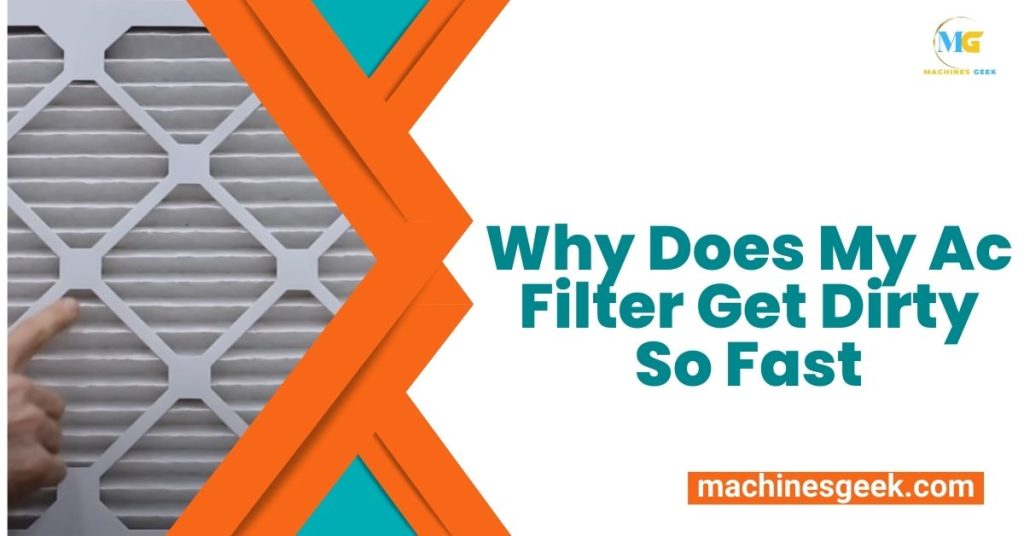Why Does My Ac Filter Get Dirty So Fast? The AC filter gets dirty quickly due to accumulated dust and debris in the air. An AC unit pulls air from the environment, and as the air passes through the filter, it traps particles, resulting in a dirty filter.
This can occur more rapidly if there is excessive dust, pet hair, or a lack of regular filter cleaning or replacement. A dirty filter restricts airflow, causing the AC unit to work harder, reduce efficiency, and potentially lead to breakdowns or increased energy consumption.
Regular maintenance and cleaning of the AC filter is essential for optimal functioning and air quality.
Understanding The Causes
The air filter in your AC system plays a crucial role in keeping your indoor air clean and healthy. However, you may find that your AC filter gets dirty at an alarming rate. Understanding the causes behind this issue can help you address it effectively.
Airborne dust and debris are one of the primary culprits behind a quickly dirty AC filter. These particles can enter your home through open doors and windows or be carried in on clothing and shoes. Pet dander and hair also contribute to the accumulation of dirt in the filter, especially if you have furry companions. Pollen and allergens from outdoor sources may find their way into your indoor environment and get trapped in the filter.
Mold and mildew spores can thrive in moist areas and circulate through your home’s ventilation system, leading to dirty filters. Finally, inadequate filter maintenance, such as not changing the filter regularly or using filter types with lower efficiency, can result in faster dirt buildup.
Effects Of Dirty Ac Filters
Dirty AC filters can have several negative effects on your HVAC system and indoor air quality. One of the main consequences of a dirty air filter is reduced airflow and efficiency. When a filter becomes clogged with dirt and debris, it restricts the flow of air through the system, making it work harder to achieve the desired temperature. This increased strain on the system leads to higher energy consumption, resulting in higher utility bills.
In addition, a dirty AC filter can also lead to poor indoor air quality. As the filter becomes overloaded with dust and pollutants, it can no longer effectively trap these particles, allowing them to circulate throughout your home. This can exacerbate allergies and respiratory issues for those with sensitivities.
Moreover, neglecting to change your AC filter regularly can potentially cause damage to your HVAC system. The increased strain on the system can lead to overheating, motor burnout, and other costly repairs. It is important to regularly inspect and replace the air filter to ensure the longevity and optimal performance of your HVAC system.
Overall, the accumulation of dirt and debris on AC filters can have significant consequences on airflow, efficiency, energy consumption, indoor air quality, and the condition of your HVAC system. Regularly replacing your AC filter is a simple yet essential maintenance task to keep your system running smoothly and maintain a healthy indoor environment.
Tips For Preventing Dirty Ac Filters
The main reason why AC filters get dirty so fast is due to the accumulation of dust, allergens, and other particles in the air. These particles can clog the filter, reducing its effectiveness and causing the AC system to work harder and consume more energy.
Regular filter replacement is crucial to keep your AC system running efficiently. It is recommended to replace the filters every 1-3 months, depending on the manufacturer’s guidelines and the air quality in your area.
In addition to regular filter replacement, proper HVAC system maintenance is essential. This includes keeping the coils and fins clean, checking for leaks or blockages, and ensuring proper insulation.
Enhanced air filtration techniques can also help prevent dirty filters. High-efficiency particulate air (HEPA) filters are designed to capture even the smallest particles, including allergens and bacteria. Electrostatic filters use static electricity to attract and trap particles, while ultraviolet (UV) germicidal lights kill bacteria and mold.
Minimizing dust and contaminant sources can greatly reduce the frequency at which AC filters get dirty. Regular cleaning of the house, vacuuming carpets and upholstery, and keeping windows and doors closed can help keep the indoor air clean.
Controlling humidity levels is another important factor. High humidity can create a breeding ground for mold and bacteria, which can contribute to clogged filters. Using dehumidifiers and air conditioners with built-in humidity control can help prevent this.
Frequently Asked Questions
Why Does My AC Filter Get Dirty So Fast?
Your AC filter can get dirty quickly due to several reasons, including high usage, poor indoor air quality, and lack of regular maintenance.
Is a Clean AC Filter a Sign of a Problem with My AC System?
If a dirty AC filter is not getting replaced regularly, it could lead to various AC system issues. A clean AC filter is crucial for proper airflow and can prevent problems such as reduced cooling efficiency, increased energy consumption, and potential damage to the AC system. Regular filter maintenance is essential.
Conclusion
To conclude, the frequency at which your AC filter gets dirty is influenced by several factors. These include the presence of pets, the quality of air in your area, and how often you use your HVAC system. Regularly changing or cleaning your filter is crucial to maintain a clean and efficient air conditioning unit.
By understanding the reasons behind a fast accumulation of dirt, you can take proactive measures to improve air quality and prolong the life of your AC system.








